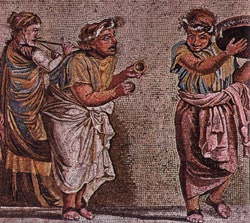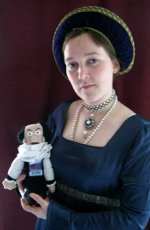When I was asked to write a blog post about Ancient Greek comedy, I was stumped. I don’t know much about Greek comedy, I protested. But after a little research, I present to you my thoroughly ignorant and dilettante article, which I hope will at least entertain, if not enlighten.
According to the philosopher Aristotle, comedy is a representation of silly people involved in blunders that are not disastrous. Comedy as a separate genre developed in Ancient Greece sometime around the 6th century BCE, much later than tragedy. While theater was meant to be part of religious festivals, plays weren’t just a way to honor the gods or entertain the masses; they were also a competitive sport. During religious festivals like City Dionysia and the Lenaea a number of comedies were performed and then judged by a panel of ten judges. The winner got a prize. I think it was a goat, but don’t quote me on that.
There were doubtlessly many aspiring playwrights at the time, but most of their works have been lost. The only one who left us a number of complete plays is Aristophanes, the author of The Knights, The Clouds, Peace, and many more. Unfortunately, as anyone who ever tried to watch a sitcom from different culture would know, comedies are notoriously difficult to translate. And when more than 2000 years separates you and the play, the humor is mostly lost.
One comedy, however, does get translated and performed quite a lot to this day. Aristophanes’s Lysistrata is a raunchy sex comedy – literally. It’s a story about Athenian women who get tired of the never-ending war and go on a sex strike to pressure their men to stop fighting. The comedy is still popular today as it reads both as an anti-war and a proto-feminist play. Since human anatomy hasn’t changed that much, most of the sex jokes still work. But even this play has some humor that will leave you scratching your head. One joke about eels is particularly mystifying.
While many jokes are lost to the ages, the spirit of comedy lives on. Most modern sitcoms rely on blunders without tragic consequences as their punch line, while a lot of contemporary humor is at the expense of politicians and other notable figures. So every time you watch Dr. Strangelove , or enjoy Friends reruns on TV, or laugh at someone being hit in the face with a cream pie, think of it as a glorious heritage left to us by our Ancient Greek ancestors.
![]()
Nastia Diatlova, stage name Anastasia, was taken to the theater as a little girl by her grandmother. The impression on her little innocent mind was so strong that she became a lifelong thespian. She likes directing, costuming and heavy-handed prose.
This Thespians Anonymous blog is related to our new spring production, coming out in May 2014, The Iliad, The Odyssey, and All of Greek Mythology, In 99 Minutes or Less! Keep following us for more information coming soon!



